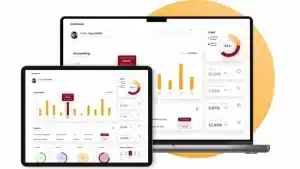Growing a startup is never easy, and the pressure to scale while keeping operations smooth is immense. Implementing ERP software could be the game-changer your business needs to simplify processes and unlock growth potential.
Many startup managers face difficulties such as inefficient workflows, disjointed data, and lack of scalability that prevent them from competing effectively in a fast-moving market. These pain points are often due to outdated systems or a lack of integration.
For instance, a study on Philippine startups by BusinessWorld revealed that companies using ERP systems experienced smoother operations, reduced manual tasks, and improved customer satisfaction. For example, TechnoStart in the Philippines grew 30% within a year of adopting an ERP system.
Handa ka na bang malampasan ang mga pagsubok na ito? Learn how ERP software can address common startup challenges and drive sustainable growth, providing solutions tailored to your business needs.
Table of Contents

Key Takeaways
|
What is ERP Software?
Enterprise Resource Planning (ERP) software is a technology businesses use to coordinate and manage their operations more effectively. It streamlines processes, ensuring that different organisational departments work together seamlessly.
Many companies, including ERP startups, use ERP software solutions for comprehensive resource planning. These systems combine the processes necessary for managing business operations—such as inventory, sales, and finance—into a single platform, making it easier for teams to collaborate and make informed decisions.
Moreover, ERP software is designed to support various business functions, including planning, purchasing, sales, marketing, and finance. By integrating all these functions into one system, ERP for startups allows companies to scale and adapt to changing needs more efficiently.
Why do Startups Need an ERP System?

Startups face a myriad of challenges as they seek to establish themselves in competitive markets. One of the most effective ways to overcome these obstacles is to implement an ERP system, which helps increase efficiency and gain cost advantages—two crucial factors for any startup’s success.
A startup ERP system provides real-time insights and centralized data, enabling better decision-making and allowing businesses to scale without losing control over operations. This unified approach helps startups quickly adjust to market demands and operational complexities, making it easier to focus on growth.
Here is why ERP systems are vital for startups:
- Streamlined decision-making: An ERP system consolidates data from various departments, providing decision-makers with a comprehensive view for quick action. This integration also supports better asset and risk management, ensuring informed decisions.
- Attracting investors: ERP systems help startups demonstrate organized and efficient operations, boosting investor confidence. A transparent system lets investors easily track performance and evaluate the company’s growth potential.
- Cost efficiency: ERP systems offer cost-effective, scalable solutions crucial for startups with limited resources. They help minimize operational expenses while enhancing productivity and profitability.
In conclusion, implementing an ERP system for startups is about improving internal operations and positioning the business for growth and investment. A startup ERP can help streamline processes, make data-driven decisions, and keep costs in check—critical advantages for startups aiming to succeed in today’s competitive business environment.
How do ERP Systems Help Startups?

An ERP system helps startups by collecting and centralizing data from various business functions, ensuring real-time access to accurate and standardized information. This integration improves the efficiency of different departments and streamlines processes, making it easier for startups to scale and adapt in competitive markets.
How ERP Systems Benefit Startups:
- Financial Management: ERP systems provide a comprehensive view of financial data, such as accounts payable, receivable, and cash flows, helping startups manage finances effectively. By automating accounting tasks, ERP systems allow employees to focus more on strategic data analysis and growth forecasts.
- Human Resource Management: ERP systems organize crucial HR data, including employee details, performance metrics, and leave management, making it easier for startups to allocate resources efficiently. This leads to better HR strategies, improved employee satisfaction, and a healthier work environment.
- Customer Relationship Management: Startups can maintain a competitive edge by using ERP to consolidate customer data, ensuring a unified approach to customer interactions. ERP systems also help track customer preferences, manage leads, and enhance customer service, contributing to sustained business growth.
- Supply Chain Management: Efficient supply chain management is vital for startups, and ERP systems streamline this process by handling everything from material acquisition to product delivery. This ensures startups meet deadlines and maintain a steady supply of resources without disruptions.
- Inventory Management: With an ERP system, startups can track inventory across the entire supply chain, automate paperwork, and monitor costs. This boosts efficiency, reduces errors, and keeps inventory management on track, leading to better financial control.
- Project Management: ERP systems automate project management tasks, making it easier for startup founders to oversee product launches, marketing campaigns, and other essential projects. This ensures the smooth execution of critical activities, even when time is limited.
- Compliance and Quality Management: An ERP system helps startups comply with industry regulations by providing essential documentation and facilitating audits. It also automates quality control processes, ensuring that startups effectively meet both internal and external quality standards.
In summary, an ERP startup solution is a powerful tool that improves the efficiency of core business functions. It helps startups manage growth, compliance, and customer relationships while keeping costs in check.

7 Ways How an ERP System Can Help Your Startup Grow

An ERP system can be a game-changer for your startup. It offers the tools you need to streamline operations and drive growth. Centralizing essential business functions empowers you to make data-driven decisions and scale efficiently.
Let’s explore how implementing an ERP system can accelerate your startup’s success with these seven impactful strategies.
1. Automate the order-to-cash process
Traditional accounting systems require manual order execution, sales fulfillment, and invoice creation, which can be prone to human error and slow down the transaction chain. This can result in delayed payments and inefficient cash flow management.
By implementing the best ERP system, startups can automate up to 85% of the process, integrating finance, sales, and fulfillment modules for faster and more accurate reporting. This automation leads to smoother operations and quicker financial transactions, ensuring a more streamlined cash flow.
2. Improved market analysis with ERP software
Effective business development relies on understanding data, identifying opportunities, making informed decisions, and continually improving. ERP software enables businesses to collect and manage data seamlessly across various departments, transforming it into valuable business intelligence reports.
These insights can be used to target the right market segments and resell more efficiently, giving startups a competitive edge. By leveraging this data, startups can make smarter decisions and stay ahead in the marketplace.
3. Prepare for future requirements with ERP software
Building a sustainable business requires foresight and careful planning, especially for startups looking to scale. Investing in an ERP system early on can give a startup a competitive advantage, helping it grow faster than competitors.
The daily use of ERP software will guide startups through necessary changes, overcoming the challenges typically faced by mature businesses, such as costly and time-consuming adjustments.
With the rise of affordable cloud-based ERP solutions, startups no longer need to worry about prohibitive costs, making it an essential investment for long-term success.
4. Production cost control with ERP software
Managing production costs manually is time-consuming and prone to errors, negatively affecting business performance. ERP software provides comprehensive visibility by tracking raw materials, production costs, and defective product components all in one place.
It allows startups to manage their entire production process, from purchase to delivery, while offering insights into sales and related statistics. This transparency ensures that decision-makers can make informed choices to optimize costs and improve efficiency.
5. Real-time reporting
Real-time data analysis is crucial for business growth, and ERP systems enable you to access up-to-date reports on your business performance at any time, from anywhere. Cloud-based ERP solutions offer customizable dashboards and visual representations like graphs and charts, making it easier to analyze data.
These systems also allow for controlled access to report data, ensuring that sensitive information is protected. By leveraging real-time insights, startups can stay agile and make informed decisions based on the latest data.
6. Automate activities to maintain client relationships
CRM, an integral part of ERP, helps startups manage customer relationships by organizing data in a central database, making it easier to track customer interactions. This lets businesses quickly respond to customer queries, improving customer satisfaction and loyalty.
By automating customer data management, startups can stay on top of communications and deliver personalized service. CRM software helps maintain valuable relationships by keeping track of customer discussions, ensuring no opportunity for engagement is missed.
7. Used across multiple devices
ERP software offers flexibility, allowing startups to access and manage their business operations from multiple devices, such as laptops and mobile phones. This accessibility ensures that business leaders can monitor and control operations from anywhere.
With cloud-based ERP, you are not confined to an office desk—empowering you to make decisions on the go. The convenience of accessing critical business data across devices helps startups stay responsive and efficient in a fast-paced market.
What to Look for in an ERP?

Selecting the right ERP system is crucial for startups, as it can significantly impact your business’s growth and efficiency. Choosing the best ERP solution can be overwhelming with various options available, including cloud-based systems and AI-enhanced features.
It’s particularly challenging for startups because of limited resources and a lack of experienced staff to guide the selection process. Although every business has unique needs, most ERP systems should possess several essential attributes to meet your startup’s requirements.
Key factors to consider when choosing an ERP:
- Budget-friendly: ERP systems can be expensive, but startups can benefit from cloud-based subscription models. These systems offer flexibility and affordability compared to significant upfront investments, allowing you to manage costs while getting your business’s essential functionalities.
- Scalable: Your ERP system should be able to grow with your business. As a startup, investing in an ERP system that can easily accommodate changes in resources and market demands is vital. Cloud-based ERP solutions are ideal for this, as they offer scalability without requiring extensive infrastructure changes.
- Simple: While many ERP systems offer an extensive range of features, it is essential to focus on what you truly need. Avoid opting for unnecessary functionalities like task management or automated data uploads that might complicate your workflows without adding value to your startup’s core operations.
- Easy to use: A user-friendly interface is key to efficiency. When selecting an ERP system, ensure it has a modern, intuitive design with a simple menu structure, allowing users to access features effortlessly. This ease of use will minimize your team’s learning curve, saving valuable time.
- Trustworthy: Transparency and trust are vital when managing business data. Your ERP solution should provide secure data storage, real-time insights, and comprehensive reporting capabilities, enabling you to make informed decisions based on accurate information.
- Secure: Cybersecurity threats are a significant concern for startups, which often lack the resources for extensive protection. Choose an ERP solution that offers robust security measures, especially those built into cloud-based systems, to protect your data from potential breaches.
- Responsive support: Make sure your ERP provider offers excellent customer support. Whether during implementation, customization, or ongoing maintenance, having access to responsive assistance is crucial for resolving issues promptly and ensuring your ERP system functions smoothly.
In conclusion, selecting the right ERP startup solution involves considering both your current needs and future growth. By choosing a scalable, user-friendly, and secure ERP system that fits your budget, your startup can streamline operations, enhance decision-making, and position itself for long-term success.
Automate your Startup Business Processes with Hash Core ERP Solution

HashMicro’s ERP Software for Startups in the Philippines is a comprehensive solution designed to help new businesses streamline their operations and achieve scalability. It has advanced features for managing various business processes, from financial tracking to sales and inventory, and provides real-time insights to drive informed decision-making.
If you want to learn more about how HashMicro’s ERP software can optimize your startup operations, you can try a free demo today. This will give you a hands-on understanding of its capabilities and how it can help your business grow efficiently.
Some key features of HashMicro’s ERP Software include:
- Built-in BI (Business Intelligence): With tools like Pivot, Key Performance Indicators (KPI) Scorecards, Custom BI, and Dashboard Ninja, this feature empowers businesses with actionable insights. It enables real-time data visualization and analysis, helping decision-makers track performance and make strategic adjustments effortlessly.
- Sheet Management: Efficiently manage, automate, and analyze business spreadsheets or documents while ensuring seamless module integration. This feature enhances data accuracy and security, streamlining workflows for greater productivity.
- Access-Level: Protect sensitive information by assigning specific access levels to employees, preventing unauthorized data exposure. Managers gain better oversight with a clear view of staff activities, ensuring operational transparency and security.
- AI-Generated Report & Explainer: Generate detailed, easy-to-understand reports enriched with actionable recommendations to improve business performance. This feature also identifies and flags suspicious cost anomalies, acting as a virtual assistant for proactive decision-making.
- Restricted User: This feature enhances data security by requiring users to connect through the office’s Wi-Fi and blocking unauthorized external access. It minimizes the risks of data breaches and ensures sensitive information stays protected within the workplace.
- Flexible Hosting Methods: Choose between cloud hosting for scalability and convenience or on-premise solutions for greater data control and security. This flexibility allows businesses to adapt their ERP infrastructure to specific operational needs.
- Mobile Apps: Empower remote work by enabling employees to access the ERP system from anywhere through mobile applications. This fosters productivity and flexibility, ensuring smooth operations even when working offsite.
The software also seamlessly integrates with third-party systems, ensuring smooth data flow across platforms. Highly customizable, it allows startups to tailor its features to meet their unique needs, whether it’s managing finances, optimizing inventory, or streamlining customer relationship management.
Conclusion
ERP software is essential for large corporations and startups striving to grow and succeed in today’s competitive business environment. Implementing an effective ERP system helps startups integrate and streamline their business processes, ensuring efficiency across every department.
HashMicro offers one of the best ERP solutions tailored to startups’ needs. Their comprehensive ERP Software simplifies various operational tasks, from customer management to finance and inventory tracking, allowing startups to focus on growth and innovation.
To truly understand the impact of an ERP system, it’s essential to experience it firsthand. Requesting a free demo of HashMicro’s ERP software will allow you to explore how it can optimize your business operations and contribute to your startup’s success.

FAQ About Startup ERP
-
What are the four types of ERP?
ERP systems can be categorized into four main types, each catering to different organizational needs:
1. On-Premise ERP: Installed and maintained on the company’s own servers and infrastructure.
2. Cloud ERP: Hosted on a cloud platform, accessible through the internet, offering flexibility and scalability.
3. Hybrid ERP: Combines on-premise and cloud solutions, allowing businesses to customize their setup.
4. Multicloud ERP: Utilizes multiple cloud services for different business functions, enhancing resilience and specialization. -
What does an ERP do?
Enterprise Resource Planning (ERP) software helps organizations manage and streamline core business operations. It integrates various functions, such as accounting, procurement, project management, risk and compliance, and supply chain management, into a unified system. ERP systems enhance efficiency, accuracy, and decision-making by providing real-time data and insights.
-
Do small businesses need ERP?
ERP systems can benefit small businesses, as they centralize operations, improve efficiency, and ensure accurate data management. They also offer long-term cost savings by automating repetitive tasks and optimizing resources. However, small businesses must carefully evaluate the associated costs and implementation challenges to ensure the system aligns with their needs and growth potential.



































